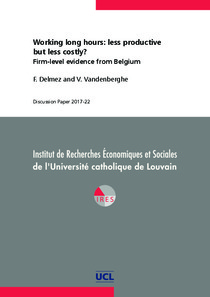Working long hours: less productive but less costly? Firm-level evidence from Belgium
"From the point of view of a profit-maximizing firm, the optimal number of working hours depends not only on the marginal productivity of hours but also on the marginal labour cost. This paper develops and assesses empirically a simple model of firms' decision making where productivity var...
| Main Authors: | , |
|---|---|
| Institution: | ETUI-European Trade Union Institute |
| Format: | TEXT |
| Language: | English |
| Published: |
Louvain-la Neuve
2017
UCL |
| Subjects: | |
| Online Access: | https://www.labourline.org/KENTIKA-19396695124911148779-Working-long-hours-less-produc.htm |
| Summary: | "From the point of view of a profit-maximizing firm, the optimal number of working hours depends not only on the marginal productivity of hours but also on the marginal labour cost. This paper develops and assesses empirically a simple model of firms' decision making where productivity varies with hours and where the firm faces labour costs per worker that are invariant to the number of hours worked: i.e. quasi-fixed labour costs. Using Belgian firm-level data on production, labour costs, workers and hours, and focusing of the estimation of workers/hours elasticities of isoquant and isocost, we find evidence of the declining productivity of hours, but also of quasi-fixed labour costs in the range of 20% of total labour costs. We also show that industries with larger estimated quasi-fixed labour costs display higher annual working hours and make less use of part-time contracts. The tentative conclusion is that firms facing large quasi-fixed labour costs are enticed to raise working hours (or oppose their reduction), even if this results in lower labour productivity." |
|---|---|
| Physical Description: | 33 p. Digital |

